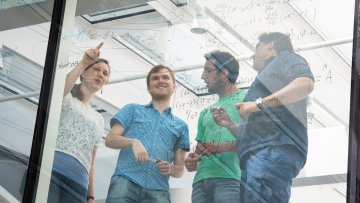Oxford Mathematics welcomes the announcement from UK Research and Innovation (UKRI) of major new funding for the mathematical sciences. Professor Mike Giles, Head of Department, said "I am delighted to see UKRI's announcement of major new funding for the mathematical sciences. I think this recognises the huge impact of mathematical sciences in the whole economy, as well as in the NHS and other aspects of public life.
Functional calculus for analytic Besov functions
Abstract
There is a class $\mathcal{B}$ of analytic Besov functions on a half-plane, with a very simple description. This talk will describe a bounded functional calculus $f \in \mathcal{B} \mapsto f(A)$ where $-A$ is the generator of either a bounded $C_0$-semigroup on Hilbert space or a bounded analytic semigroup on a Banach space. This calculus captures many known results for such operators in a unified way, and sometimes improves them. A discrete version of the functional calculus was shown by Peller in 1983.
Sobolev embeddings, rearrangement-invariant spaces and Frostman measures
Abstract
In this talk, we discuss Sobolev embeddings into rearrangement-invariant function spaces on (regular) domains in $\mathbb{R}^n$ endowed with measures whose decay on balls is dominated by a power $d$ of their radius, called $d$-Frostman measures. We show that these embeddings can be deduced from one-dimensional inequalities for an operator depending on $n$, $d$ and the order $m$ of the Sobolev space. We also point out an interesting feature of this theory - namely that the results take a substantially different form depending on whether the measure is decaying fast ($d\geq n-m$) or slowly ($d<n-m$). This is a
joint work with Andrea Cianchi and Lubos Pick.
The dark side of the universe and quantum gravity (postponed from Week 1)
16:00
The $L^1$ semi-group of the multi-dimensional Burgers equation
Abstract
The Kruzkhov's semi-group of a scalar conservation law extends as a semi-group over $L^1$, thanks to its contraction property. M. Crandall raised in 1972 the question of whether its trajectories can be distributional, entropy solutions, or if they are only "abstract" solutions. We solve this question in the case of the multi-dimensional Burgers equation, which is a paradigm for non-degenerate conservation laws. Our answer is the consequence of dispersive estimates. We first establish $L^p$-decay rate by applying the recently discovered phenomenon of Compensated Integrability. The $L^\infty$-decay follows from a De Giorgi-style argument. This is a collaboration with Luis Sivestre (University of Chicago).
16:00
Regularity and rigidity results for nonlocal minimal graphs
Abstract
Nonlocal minimal surfaces are hypersurfaces of Euclidean space that minimize the fractional perimeter, a geometric functional introduced in 2010 by Caffarelli, Roquejoffre, and Savin in connection with phase transition problems displaying long-range interactions.
In this talk, I will introduce these objects, describe the most important progresses made so far in their analysis, and discuss the most challenging open questions.
I will then focus on the particular case of nonlocal minimal graphs and present some recent results obtained on their regularity and classification in collaboration with X. Cabre, A. Farina, and L. Lombardini.
InFoMM CDT Group Meeting
15:45
Variants of Quantum sl(2) and invariants of links involving flat connections
Abstract
Witten-Reshetikhin-Turaev quantum invariants of links and 3 dimensional manifolds are obtained from quantum sl(2). There exist different versions of quantum sl(2) leading to other families of invariants. We will briefly overview the original construction and then discuss two variants. First one, so called unrolled quantum sl(2), allows construction of invariants of 3-manifolds involving C* flat connections. In simplest case it recovers Reidemeister torsion. The second one is the non restricted version at a root of unity. It enables construction of invariants of links equipped with a gauge class of SL(2,C) flat connection. This is based respectively on joined work with Costantino, Geer, Patureau and Geer, Patureau, Reshetikhin.
12:00
New solutions to the stationary and dissipative Ginzburg-Landau model
Abstract
I will describe new solutions to the stationary Ginzburg-Landau equation in 3 dimensions with vortex lines given by interacting helices, with degree one around each filament and total degree an arbitrary positive integer. I will also present results on the asymptotic behavior of vortices in the entire plane for a dissipative Ginzburg-Landau equation. This is work in collaboration with Manuel del Pino, Remy Rodiac, Maria Medina, Monica Musso and Juncheng Wei.


